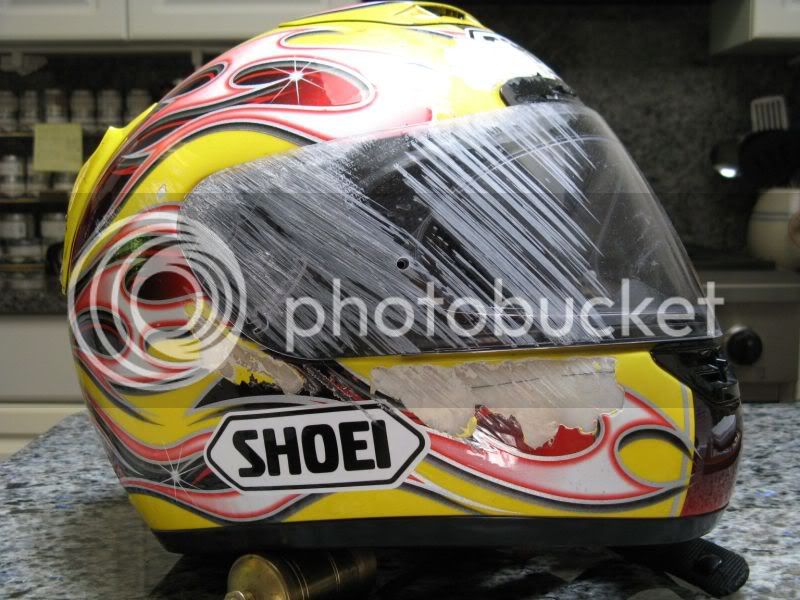Below is quite a number of years old...I won't wear anything besides a flip...went from Fulmer to current IS-Max
My rule has always been to "just wear a proper fitting helmet" and "let it be"
https://motorcycleinfo.calsci.com/Helmets.html
<Anybody know what helmet Brodie was wearing when he invaded that pickup's cab???>
I have never owned one of these new flip-open helmets, most notably the HJC, Nolan, and Schuberth. None of the flip-open helmets have been submitted to Snell for testing. I now believe this is because the manufacturers know that the helmets will fail the test. I have heard several stories now about people crashing in flip-open helmets and getting eye socket damage and concussions - in one case, a personal friend of mine. My friend had what seemed to be a relatively minor side impact on his head - the helmet was barely scarred at all. However, at the hospital he fell into a coma for three days, and was confused for another couple of weeks. He required two surgerys to repair his eye sockets so that his eyes would stay in his head. Frankly, his story really shook me up and I started investigating these helmets much more closely. I was not impressed with what I learned.
The shell of the flip-open helmets apparently work just fine. I have no indication that these helmets tend to open in a crash and expose your face. However, the hinge mechanism in flip-open helmets takes up space that in any other helmet would be shock- absorbing EPS styrofoam protecting your temples. The hinge mechanism intrudes into the impact-absorbing liner in the temple area. If you hit the side of your head on the ground (quite common in a fall) the hinge mechanism can hit your temple hard enough to break your skull. As they say in Ghostbusters, this would be bad.
I spoke at length with the people at the Snell institute about this topic (7/04). They have never had a flip-open helmet submitted to them for certification, and therefore have never tested one, nor have they paid much attention to them. They found my statement, that flip-open helmets can cause temple damage, quite interesting. I learned from them that essentially all helmet manufacturers have in-house testing facilities and do a very good job of this. They named three companies in particular who do a superlative job; all three make flip-open helmets. I was told that the manufacturers can perform the Snell certification tests just as well as Snell can, so they know well in advance if they are going to pass.
Snell and DOT testing is performed with a magnesium dummy head in the helmet. The magnesium head has one accelerometer located at the center of gravity. This means the accelerometer cannot test for twisting forces, and it can only record the average impact force on the head, the force averaged over the entire surface of the magnesium head. There is no way this device could record a sharp impact on a small area, such as might occur if the hard plastic hinge mechanism hit the magnesium skull. The Snell and DOT tests have separate tests for the shell, to see that they resist penetration by sharp objects. The tests are not designed to record if a small hard object already inside the shell hits your head. So, it turns out that Snell and DOT tests are not very sensitive to an impact from a hinge mechanism.
None the less, it's interesting that only one of the flip-open helmets have ever been submitted to Snell for independent testing. Some of the companies that make these helmets pay to have essentially all of their other street helmets certified, but not the flip-open in particular. I find this exceedingly suspicious. There is one Snell-certified modular helmet now (5/10), the Zeus 3000. If you must have a modular, this is the one.
I recommend you avoid flip-open helmets if safety is a concern. Side impacts to your head are quite common in motorcycle accidents. The temple area is the weakest part of the skull. Injury to the temple area can cause substantial brain damage and substantial vision impairment. If you have a side impact in a crash I believe flip-open helmets will likely cause temple fractures and concussions far in excess of what you would have from a full-face or open-face Snell helmet. I believe you're safer in an open-face helmet than in a flip-open.
Update 8/07: I continue to receive emails from riders who have had temple damage while wearing flip-open helmets. It seems perhaps there is a particular brand that has this problem; none the less I stand by my position that the convenience of the flip-opens is not worth the risk of eye socket damage, concussion, and multiple surgeries.





















































